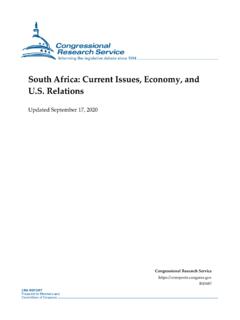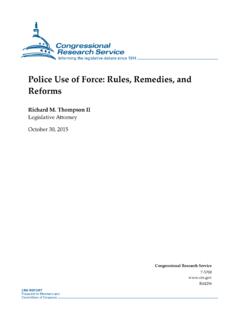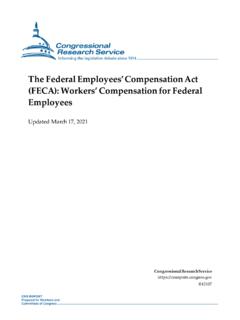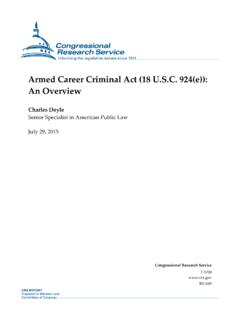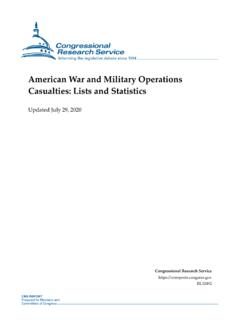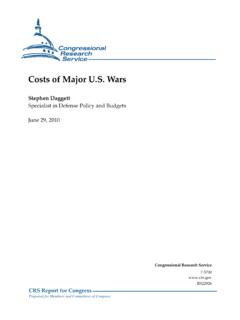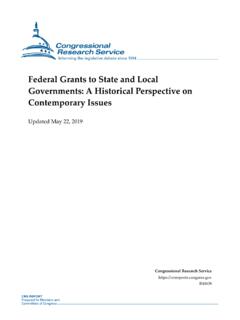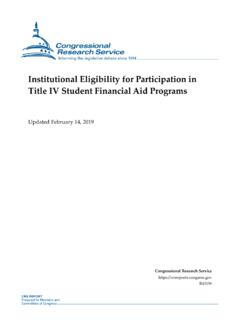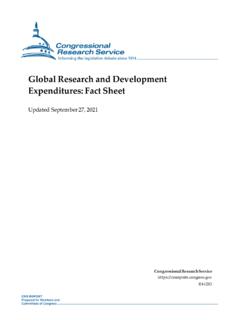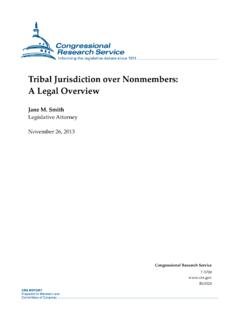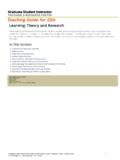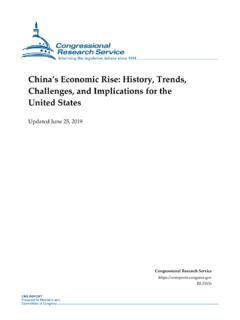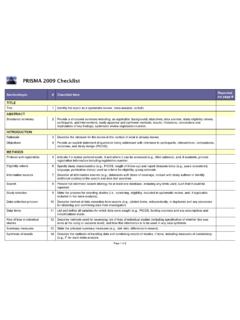Transcription of Renewed Great Power Competition: Implications for …
1 Renewed Great Power competition : Implications for Defense Issues for Congress Updated December 21, 2021 Congressional Research Service R43838 Renewed Great Power competition : Implications for Defense Issues for Congress Congressional Research Service Summary The emergence of Great Power competition with China and Russia has profoundly changed the conversation about defense issues from what it was during the post-Cold War era: Counterterrorist operations and military operations in the Middle East which were moved to the center of discussions of defense issues following the terrorist attacks of September 11, 2001 are now a less-dominant element in the conversation, and the conversation now features a new or Renewed emphasis on the following, all of which relate to China and/or Russia: grand strategy and the geopolitics of Great Power competition as a starting point for discussing defense issues; organizational changes within DOD; nuclear weapons, nuclear deterrence, and nuclear arms control; the global allocation of military force deployments; and allied military capabilities in the Indo-Pacific region; and NATO military capabilities in Europe; new military service operational concepts; capabilities for conducting so-called high-end conventional warfare; maintaining superiority in conventional weapon technologies; innovation and speed of weapon system development and deployment; mobilization capabilities for an extended-length large-scale conflict; supply chain security, meaning awareness and minimization of reliance in military systems on foreign components, subcomponents, materials, and software.
2 And capabilities for countering so-called hybrid warfare and gray-zone tactics. The issue for Congress is how defense planning should respond to the emergence of Great Power competition with China and Russia, and whether to approve, reject, or modify the Biden Administration s proposed defense funding levels, strategy, plans, and programs for addressing Great Power competition . Congress s decisions on these issues could have significant Implications for defense capabilities and funding Great Power competition : Implications for Defense Issues for Congress Congressional Research Service Contents Introduction .. 1 background .. 1 Shift to Renewed Great Power competition .. 1 Overview .. 1 Alternate Term: Strategic competition .. 3 Overview of Implications for Defense .. 3 Grand Strategy and Geopolitics of Great Power competition .. 4 Organizational Changes within DOD .. 5 Nuclear Weapons, Nuclear Deterrence, and Nuclear Arms Control.
3 5 Global Allocation of Military Force Deployments .. 7 and Allied Capabilities in Indo-Pacific Region .. 11 and NATO Capabilities in Europe .. 13 New Operational Concepts .. 14 Capabilities for High-End Conventional Warfare .. 14 Maintaining Superiority in Conventional Weapon Technologies .. 15 Innovation and Speed of Weapon System Development and Deployment .. 16 Mobilization Capabilities for Extended-Length Conflict .. 18 Supply Chain Security .. 19 Capabilities for Countering Hybrid Warfare and Gray-Zone Tactics .. 20 Issues for Congress .. 20 Appendixes Appendix A. Shift from Post-Cold War Era to Renewed Great Power competition .. 24 Appendix B. Articles on Shift to Renewed Great Power competition .. 32 Appendix C. Articles on Grand Strategy and Geopolitics .. 37 Appendix D. Readings on Supply Chain Security .. 46 Appendix E. Articles on Russian and Chinse Irregular, Hybrid, and Gray-Zone Warfare.
4 51 Appendix F. Congress and the Late 1980s/Early 1990s Shift to Post-Cold War Era .. 59 Contacts Author Information .. 61 Renewed Great Power competition : Implications for Defense Issues for Congress Congressional Research Service 1 Introduction This report provides a brief overview of Implications for defense of the emergence of Great Power competition with China and Russia. The issue for Congress is how defense planning should respond to the renewal of Great Power competition , and whether to approve, reject, or modify the Biden Administration s proposed defense funding levels, strategy, plans, and programs for addressing Great Power competition . Congress s decisions on these issues could have significant Implications for defense capabilities and funding requirements. This report focuses on defense-related issues and does not discuss potential Implications of the renewal of Great Power competition for other policy areas, such as foreign policy and diplomacy, trade and finance, energy, and foreign assistance.
5 background Shift to Renewed Great Power competition Overview The post-Cold War era of international relations which began in the early 1990s and is sometimes referred to as the unipolar moment (with the United States as the unipolar Power ) showed initial signs of fading in 2006-2008, and by 2014 had given way to a fundamentally different situation of Great Power competition with China and Russia and challenges by these two countries and others to elements of the international order that has operated since World War The renewal of Great Power competition was acknowledged alongside other considerations in the Obama Administration s June 2015 National Military It was placed at the center of the Trump Administration s December 2017 National Security Strategy (NSS)3 and January 2018 National Defense Strategy (NDS),4 which formally reoriented national security strategy and defense strategy toward an explicit primary focus on Great Power competition with China and Russia.
6 The Biden Administration s March 2021 Interim National Security Strategy Guidance states that we face a world of rising nationalism, receding democracy, growing rivalry with 1 The term international order is generally used to refer to the collection of organizations, institutions, treaties, rules, and norms that are intended to organize, structure, and regulate international relations during a given historical period. Key features of the international order established at the end of World War II also known as the liberal international order, postwar international order, or open international order, and often referred to as a rules-based order are generally said to include the following: respect for the territorial integrity of countries, and the unacceptability of changing international borders by force or coercion; a preference for resolving disputes between countries peacefully, without the use or threat of use of force or coercion; strong international institutions; respect for international law and human rights; a preference for free markets and free trade; and the treatment of international waters, international air space, outer space, and (more recently) cyberspace as international commons.
7 For additional discussion, see CRS Report R44891, Role in the World: background and Issues for Congress, by Ronald O'Rourke and Michael Moodie. 2 Department of Defense, The National Military Strategy of the United States of America 2015, The United States Military s Contribution To National Security, June 2015, pp. i, 1-4. 3 Office of the President, National Security Strategy of the United States of America, December 2017, 55 pp. 4 Department of Defense, Summary of the 2018 National Defense Strategy of the United States of America: Sharpening the American Military s Competitive Edge, undated but released January 2018, 11 pp. Renewed Great Power competition : Implications for Defense Issues for Congress Congressional Research Service 2 China, Russia, and other authoritarian states, and a technological revolution that is reshaping every aspect of our lives, and that protecting the security of the American people requires us to meet challenges not only from Great powers and regional adversaries, but also from violent and criminal non-state actors and extremists, and from threats like climate change, infectious disease, cyberattacks, and disinformation that respect no national borders.
8 5 The document further states (emphasis as in original): We must also contend with the reality that the distribution of Power across the world is changing, creating new threats. China, in particular, has rapidly become more assertive. It is the only competitor potentially capable of combining its economic, diplomatic, military, and technological Power to mount a sustained challenge to a stable and open international system. Russia remains determined to enhance its global influence and play a disruptive role on the world stage. Both Beijing and Moscow have invested heavily in efforts meant to check strengths and prevent us from defending our interests and allies around the world. Regional actors like Iran and North Korea continue to pursue game-changing capabilities and technologies, while threatening allies and partners and challenging regional stability.
9 We also face challenges within countries whose governance is fragile, and from influential non-state actors that have the ability to disrupt American interests. Terrorism and violent extremism, both domestic and international, remain significant threats. But, despite these steep challenges, the United States enduring advantages across all forms and dimensions of our Power enable us to shape the future of international politics to advance our interests and values, and create a freer, safer, and more prosperous Defending America also means setting clear priorities within our defense budget. First and foremost, we will continue to invest in the people who serve in our all-volunteer force and their families. We will sustain readiness and ensure that the Armed Forces remain the best trained and equipped force in the world. In the face of strategic challenges from an increasingly assertive China and destabilizing Russia, we will assess the appropriate structure, capabilities, and sizing of the force, and, working with the Congress, shift our emphasis from unneeded legacy platforms and weapons systems to free up resources for investments in the cutting-edge technologies and capabilities that will determine our military and national security advantage in the future.
10 We will streamline the processes for developing, testing, acquiring, deploying, and securing these technologies. We will ensure that we have the skilled workforce to acquire, integrate, and operate them. And we will shape ethical and normative frameworks to ensure these technologies are used responsibly. We will maintain the proficiency of special operations forces to focus on crisis response and priority counterterrorism and unconventional warfare missions. And we will develop capabilities to better compete and deter gray zone actions. We will prioritize defense investments in climate resiliency and clean energy. And we will work to ensure that the Department of Defense is a place of truly equal opportunity where our service members do not face discrimination or the scourge of sexual harassment and Taken together, this agenda will strengthen our enduring advantages, and allow us to prevail in strategic competition with China or any other nation.
